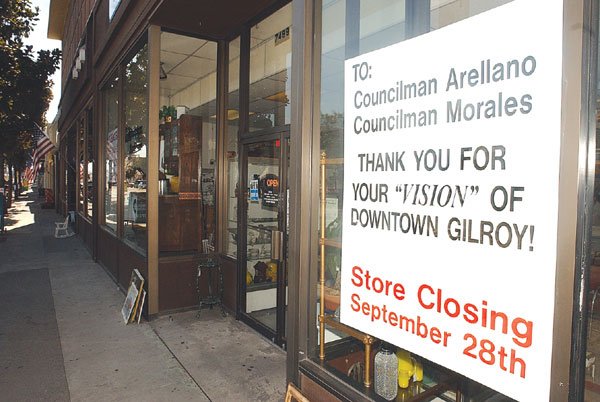GILROY
– In six days, a business located in the heart of downtown will
close its doors in protest of the low-income health clinic that is
expected to open across the street within a year.
GILROY – In six days, a business located in the heart of downtown will close its doors in protest of the low-income health clinic that is expected to open across the street within a year.
Charles Coachman, owner of Coachman Antiques at 7499 Monterey St., posted a sign in the store’s front window Thursday night that lays blame to Peter Arellano and Charlie Morales, the only two Gilroy City Council members who last month voted against a ban on health care clinics in the area. “Thank you for your ‘vision’ of downtown Gilroy!” it reads. The ban failed to get votes from the required six of the seven total Council members.
“I think (the clinic is) going to really hurt downtown,” Coachman said. “I think it’s going to hurt the community.”
Coachman wanted to post the sign because he said Arellano and Morales were ‘pandering’ to Hispanic constituents and ignoring downtown business owners by voting against the ban.
Coachman said businesses near Fifth and Monterey Streets, the possible future site of the Gardner South County Health Center, will slowly lose money because the clinic will do little to attract shoppers to the area. It is unlikely the clinic’s low-income patients will support local businesses, he said, and street parking in front of downtown retail stores will be occupied by clinic staff and patients.
Raymundo Espinoza, chief executive officer of Gardner Family Health Network, said clinic employees will likely park behind the building and patients can use a parking lot on the south side of the building adjacent to Garlic City Billiards.
Coachman will possibly relocate his shop to downtown Morgan Hill.
Councilman Peter Arellano said Coachman should not close on account of the clinic, since it has yet to open or even secure the Monterey Street location.
“Give it a chance,” Arellano said. “I don’t think anyone can close and use (the clinic) as a reason when the permits haven’t even gone through yet.”
The nonprofit medical and dental clinic, currently located at 700 W. Sixth St., is in the process of purchasing the 10,000-square-foot unit at 7526 Monterey St. presently occupied by the Garlic Festival Store. Espinoza said his company is close to completing the sale and has already submitted permits to the city’s planning commission. Espinoza estimated the clinic could be operational in nine months. The clinic would provide medical and dental services to low-income or underinsured patients.
He regretted that Coachman was blaming the clinic and said it remains to be seen if downtown clientele will change.
“I think it’s sad for a person to have that perspective,” Espinoza said. “He doesn’t even give us an opportunity to make (downtown) better. I don’t know if he’s looked around, but it wouldn’t attract a different kind of people to the area.”
Arellano echoed Espinoza’s statements, saying that more people in downtown will be better for business overall.
(The clinic is) bringing more people, it’s bringing more foot traffic,” Arellano said. “The people who work in the clinic – they need their coffee, they need their snacks. … What is wrong with low-income Hispanic people? Do they not spend money? They need their medicine, and they need their coffee, they need to eat their hamburgers and hot dogs just like everyone else.”
The clinic should stay in Gilroy, Coachman said, but not on the northeast corner of Fifth and Monterey Streets.
“Nobody wants to say that the clinic’s not needed. The clinic’s needed,” Coachman said. “But just in the middle of the downtown, just wasn’t the place for it.”
The City Council proposal opposed by Arellano and Morales in early August would have banned new health care clinics between Fourth and Eighth streets along Monterey Street.
“(Arellano and Morales) are saying that the center of downtown is the perfect place for it, and I just don’t agree,” Coachman said. “I don’t see it helping revitalization.”
City Council members said they regret losing any downtown business, particularly one that moves in spite of being successful.
“Any place in town that becomes vacant, it’s a concern because we don’t like to see vacant properties,” said Councilman Al Pinheiro, who is running for mayor. “I would wish he’d at least have given it a chance to see if all his concerns come true or not. Obviously, I hate to see anyone move from our downtown that is a thriving business.”
Pinheiro voted in favor of the ban because he would like to see more retail businesses in the area, but noted that Espinoza has agreed to lease 1,000 square feet of the clinic site to a retail store.
“There’s some businesses that were feeling they did not agree with what the clinic was going to do downtown, so they have the right to leave or stay,” said Planning Commissioner Paul Correa, who is also a City Council candidate. “There are a number of different types of businesses in downtown, and they all need to be able to work together and it’s unfortunate that they can’t.”
Pinheiro and Correa said they have not heard of other businesses planning to leave downtown and hope others will wait and see what happens.
The antiques store is at the top of its game, said Coachman, who took over the store two years ago when it was an “absolute disaster.”
“In the middle of July, we had just decided everything was going real well,” Coachman said. “I just didn’t want to deal with (the clinic), but Gilroy’s been a great place to do business in.”
Coachman hopes to continue his success once he finds a new shop location in downtown Morgan Hill.
“They’re 10 years ahead of Gilroy,” he said. “They have a specific plan set up in Morgan Hill, and it’s to have retail businesses on their street fronts. … They have a beautiful downtown, and I think Gilroy can have it, too.”












